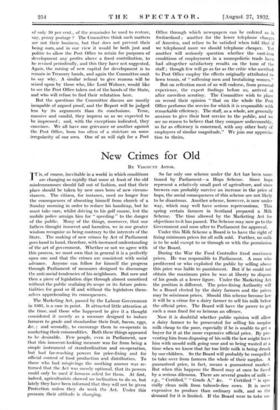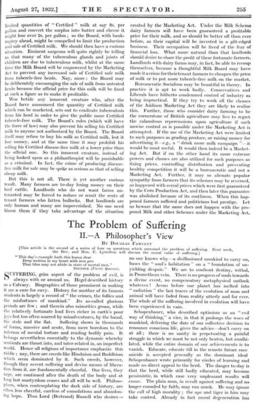New Crimes for Old
BY VISCOUNT ASTOR.
IT is, of course, inevitable in a world in which conditions are changing so rapidly that some at least of the old misdemeanours should fall out of fashion, and that their place should be taken by new ones born of new circum- stances. The citizen, for instance, need no longer fear the consequences of absenting himself from church of a Sunday morning in order to reduce his handicap, but he must take care, whilst driving to his golf course, lest the mobile police arraign him for " speeding " to the danger of the public. Many of the things, moreover, that our fathers thought innocent and harmless, we in our greater wisdom recognize as being contrary to the interests of the State. The making of new crimes by Act of Parliament goes hand in hand, therefore, with increased understanding of the art of government. Whether or not we agree with this process, we must own that in general it is a perfectly open one and that the crimes are consistent with social advance. Anyone can follow for himself the progress through Parliament of measures designed to discourage the anti-social tendencies of his neighbours. But now and then a piece of legislation slips through almost unnoticed without the public realizing its scope or its future poten- tialities for good or ill and without the legislators them- selves apprehending its consequences.
The Marketing Act, passed by the Labour Government in 1931, is a case in point. It attracted little attention at the time, and those who happened to give it a thought considered it merely as a measure designed to induce farmers to grade and standardize their fruit, bacon, eggs, &c. ; and secondly, to encourage them to co-operate in marketing their commodities. Both these things appeared to be desirable. Few people, even in Parliament, saw that this innocent-looking measure was far from being a simple instrument of standardization and co-operation, but had far-reaching powers for price-fixing and for official control of food production and distribution. To those who had misgivings the soothing answer was re- turned that the Act was merely optional, that its powers could only be used if farmers asked for them. At first, indeed, agriculturists showed no inclination to do so, but lately they have been informed that they will not be given Protection unless they do work the Act. Under this pressure their attitude is changing. So far only one scheme under the Act has been sanc- tioned by Parliament—a Hops Scheme. Since hops represent a relatively small part of agriculture, and since brewers can probably survive an increase in the price of hops, the social consequences of this scheme are not likely to be disastrous. Another scheme, however, is now under way, which may well have serious repercussions. This spring certain farmers in Scotland prepared a Milk Scheme. The time allowed by the Marketing Act for objections to it has passed. The Scheme may now go to the Government and soon after to Parliament for approval.
Under this Milk Scheme a Board is to have the right of fixing minimum prices for all milk sold. Further, no milk is to be sold except to or through or with the permission of the Board.
During the War the Food Controller fixed maximum prices. He was responsible to Parliament. A man who profiteered or who exploited the public by selling above this price was liable to punishment. But if he could not obtain the maximum price he was at liberty to dispose of his goods at a lower figure. Under the Marketing Act the position is different. The price-fixing Authority will be a Board elected by the dairy farmers and the prices may be minimum prices. Should this scheme become law it will be a crime for a dairy farmer to sell his milk below the official price. The Board will have the power to get such a man fined for so heinous an offence.
Now it is doubtful whether public opinion will allow a dairy farmer to be prosecuted for selling his surplus milk cheap to the poor, especially if he is unable to get a buyer for it at the more-expensive official price. By pre- venting him from disposing of his milk the law might leave him with unsold milk going sour and so being wasted at a time when we know that far too little milk is being drunk by our children. So the Board will probably be compelled to take over from farmers the whole of their surplus. A guaranteed price, in fact, means a guaranteed market. But when this happens the Board may at once be faced by a serious dilemma. There are several grades of milk- e.g., " Certified," " Grade A," &c. " Certified " is spe- cially clean milk from tubercle-free cows. It is more expensive to produce than ordinary milk, and so the demand for it is limited. If the Board were to take un- limited quantities of " Certified " milk at say 8s. per gallon and convert the surplus into butter and cheese it might lose over 2s. per gallon ; so the Board, with bank- ruptcy ahead, might be compelled to limit the production and sale of Certified milk. We should then have a curious situation. Eminent surgeons will quite rightly be telling us that many of the tuberculous glands and joints of children are due to tuberculous milk, whilst at the same time the Milk Board will be empowered by the Marketing Act to prevent any increased sale of Certified safe milk from tubercle-free herds. Nay, more : the Board may be deliberately encouraging the sale of milk from untested herds because the official price for this milk will be fixed at such a figure as to make it profitable.
Woe betide any innocent creature who, after the Board have announced the quantity of Certified milk which can be marketed, sets out to eradicate tuberculosis from his herd in order to give the public more Certified tubercle-free milk. The Board's rules (which will have the force of law) may also prevent his selling his Certified milk to anyone not authorized by the Board. The Board itself may refuse to buy his milk as Certified milk, lest it lose money, and at the same time it may prohibit his selling his Certified disease-free milk at a lower price than the official one. So this innocent creature, instead of being looked upon as a philanthropist will be punishable as a criminal. In fact, the crime of producing disease- free milk for sale may be quite as serious as that of selling cheap milk.
But this is not all. There is yet another curious result. Many farmers are to-day losing money on their beef cattle. Landlords who do not want farms un- tenanted may be forced to reduce or remit the rents of tenant farmers who fatten bullocks. But landlords are only human and many are impoverished. No one need blame them if they take advantage of the situation created by the Marketing Act. Under the Milk Scheme dairy farmers will have been guaranteed a profitable price for their milk, and so should be better off than ever before, as their capital will be invested in a gilt-edged business. Their occupation will be freed of the fear of financial loss. What more natural than that landlords should desire to share the profit of these fortunate farmers. Landlords with dairy farms may, in fact, be able to recoup themselves, because a thoughtful Milk Board may have made it a crime for their tenant farmers to cheapen the price of milk or to put more tubercle-free milk on the market.
Bureaucratic Socialism may be beautiful in theory. In practice it is apt to work badly. Conservatives and Liberals have hitherto condemned control of industry as being impractical. If they try to work all the clauses of the Addison Marketing Act they are likely to realize this. Further, those who consider dairy farming to be the cornerstone of British agriculture may live to regret the calamitous repercussions upon agriculture if such unwise control as is possible under the Marketing Act is attempted. If the use of the Marketing Act were limited to such purposes as grading produce, or raising money for advertising it—e.g., a " drink more milk campaign "—it would be most useful. It would then indeed be a Market- ing Act. But if on the other hand its more extreme powers and clauses are also utilized for such purposes as fixing prices, controlling distribution and preventing healthy competition it will be a bureaucratic and not a Marketing Act. Further, it may so alienate popular sympathy from farmers that its schemes may be reversed, as happened with cereal prices which were first guaranteed by the Corn Production Act, and then later this guarantee was abolished because of its costliness. When this hap- pened farmers suffered and politicians lost prestige. Let us beware that the same does not happen with the pro- posed Milk and other Schemes under the Marketing Act.



























 Previous page
Previous page